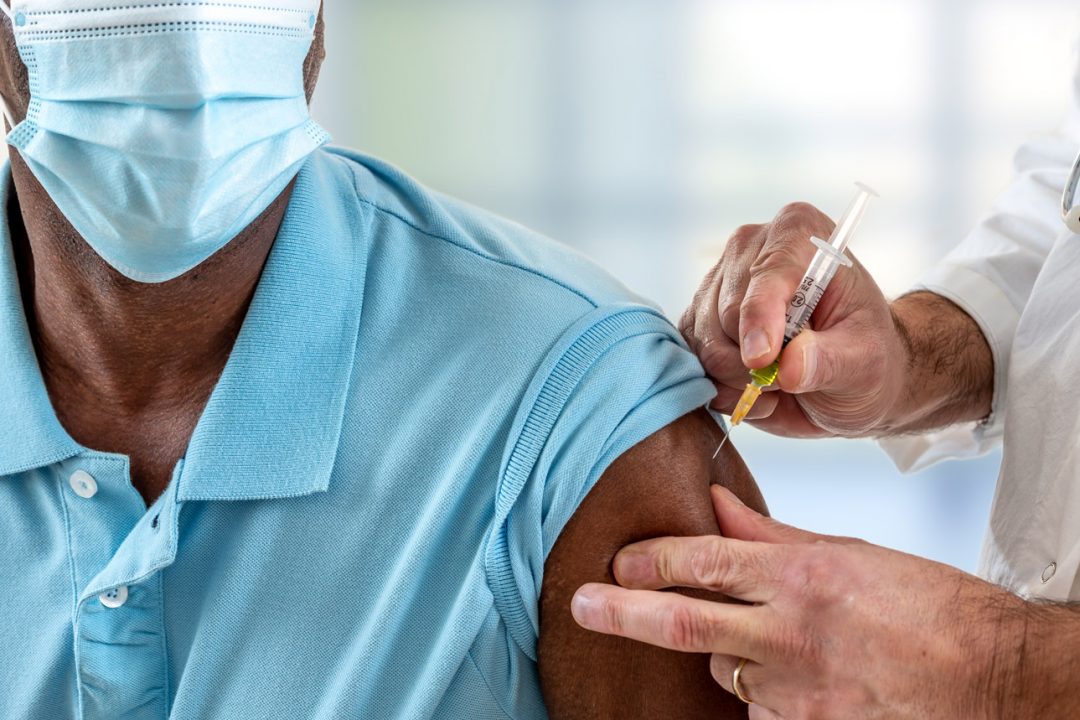A three-dose malaria vaccine shows safety, efficacy in West African adults

A three-dose regimen of a whole-parasite vaccine against malaria — called Plasmodium falciparum sporozoite (PfSPZ) vaccine — demonstrated safety and efficacy when tested in adults living in Burkina Faso, West Africa, which has endemic malaria. That is the finding of a new study published on Dec. 7, 2022, in Science Translational Medicine. Researchers at the University of Maryland School of Medicine’s Center for Vaccine Development and Global Health (CVD) led the work.
About 241 million people worldwide were infected with malaria in 2020, and 627,000 people died from their infections. Scientists have tried for decades to develop a highly effective malaria vaccine without much success. That is because the vaccines have been shown not to provide much protection in those who have already been infected with malaria earlier in life due to their acquired immunity. The first vaccine against malaria (RTS,S/AS01) was approved by the World Health Organization in October 2021, and it provides modest protection against malaria.
The new study involved 80 participants in a randomized controlled clinical trial comparing three doses of the PfSPZ vaccine against a placebo. At six months follow up, vaccine efficacy was up to 48 percent; at 18 months follow up, vaccine efficacy was up to 46 percent.
“Our study shows that the vaccine can be given to malaria-experienced adults in a highly endemic area and still provide protection, which is difficult and complicated as these individuals already have significant immune responses to malaria parasites that must be overcome by a vaccine for it to be successful,” said study corresponding author Matthew B. Laurens, MD, MPH, Professor of Pediatrics at UMSOM and Director, International Clinical Trials Unit in the Malaria Research Group at CVD.
PfSPZ Vaccine is made with a live-attenuated form of the malaria parasite Plasmodium falciparum sporozoite, which is transmitted by mosquitos. The vaccine is made by Rockville, Maryland-based Sanaria Inc. and has been shown to provide at least 90-percent protection in challenge studies where volunteers are infected with malaria (in a highly controlled way); these studies were conducted by CVD researchers in the U.S. and by other groups in Tanzania. In African adults who previously had malaria, PfSPZ provided 52 percent vaccine efficacy against naturally transmitted malaria infection. Protection lasted 8 to 14 months.
In the new study, researchers wanted to reduce the number of required injections from five shots to three, while improving vaccine efficacy. They assessed safety, tolerability, immunogencity, and vaccine efficacy of three injections of the vaccine in a two-part study.
The first part enrolled 32 adults in a dose-escalation phase in 2016 and the second enrolled 80 adults in a randomized trial in 2017. In the randomized trial, 39 received PfSPZ Vaccine and 41 received placebo. Study participants were healthy men and non-pregnant women ages 21 to 40. The vaccines were well tolerated and without concerning side effects.
“New strategies are needed to achieve the United Nations sustainable development goal of a 90-percent reduction in malaria incidence and mortality by 2030,” said UMSOM DeanMark T. Gladwin, MD, Vice President for Medical Affairs, University of Maryland, Baltimore, and the John Z. and Akiko K. Bowers Distinguished Professor. “Innovative vaccines that provide a higher level of protection against malaria are urgently needed to help to achieve this goal.”
Additional co-authors on the newly published research from UMSOM’s Center for Vaccine Development and Global Health include: Kirsten E. Lyke, MD, Professor of Medicine; Sudhaunshu Joshi, MS, Laboratory Specialist; Biraj Shrestha, Laboratory Assistant; and Kathy Strauss, Laboratory Specialis.
The new study reflects a long history of malaria vaccine development at UMSOM that started in the early 1970s with landmark research from David Clyde, MD, former head of malarial studies at CVD. His studies demonstrated that high-level protection against malaria infection is possible using a whole organism vaccine.
Future research includes conducting additional clinical trials of the PfSPZ Vaccine in groups that would benefit most from vaccine-induced protection, including children, travelers, military personnel, and pregnant women.
Many of these studies are underway, including an ongoing trial at UMSOM to administer a compressed schedule of three doses of PfSPZ Vaccine in one month, which is a feasible timeline for travelers and military populations. Results of this study are expected in 2023.
The study was funded by NIH’s National Institute of Allergy and Infectious Diseases grants U01AI112367 and 5R44AI055229.
Journal Reference:
- Sodiomon B. Sirima, Alphonse Ouédraogo, Alfred B. Tiono, Jean M. Kaboré, Edith C. Bougouma, Maurice S. Ouattara, Désiré Kargougou, Amidou Diarra, Noelie Henry, Issa N. Ouédraogo, Peter F. Billingsley, Anita Manoj, Yonas Abebe, Natasha KC, Adam Ruben, Thomas L. Richie, Eric R. James, Sudhaunshu Joshi, Biraj Shrestha, Kathy Strauss, Kirsten E. Lyke, Christopher V. Plowe, Gail E. Potter, Catherine Cox, Walter Jones, B. Kim Lee Sim, Stephen L. Hoffman, Matthew B. Laurens. A randomized controlled trial showing safety and efficacy of a whole sporozoite vaccine against endemic malaria. Science Translational Medicine, 2022; 14 (674) DOI: 10.1126/scitranslmed.abj3776




